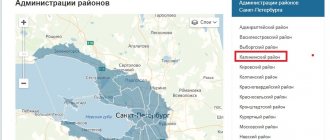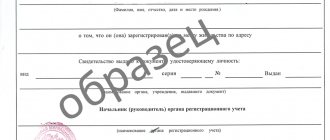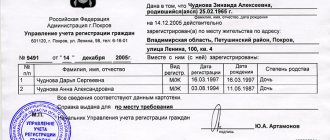If you are planning to move your whole family to another region, but do not know how to enroll your child in school without registration, do not despair. The legislation provides every opportunity to enroll in school even when parents cannot obtain a stamp in their passport indicating residence in a particular area.
People think about how to get into a school other than their registration not only when they move to another city, but also when they want to enroll their son or daughter in a prestigious gymnasium located on the other side of the city.
It is no secret that secondary educational institutions that have a certain authority among local residents for the quality of education provided are faced with increased interest from parents, including those whose children do not live in neighboring neighborhoods. That is why citizens often require a child’s temporary registration for school, which would allow them to submit documents to the educational institution of interest to them without the risk of being refused.
The legislative framework
Is the refusal of the head of the educational institution legal?
If we turn to the legislation, then according to the Law “On Education” no one has the right to refuse a person who wants to receive an education.
His race, place of residence or origin does not play any role in this. Article 43 of the Constitution of the Russian Federation also talks about accessibility of education.
Federal Law No. 310 contains rules indicating that children living in the same area where the educational institution is located have a priority right to education.
Important: therefore, the administration of an educational institution can refuse a student without a “local” registration, justifying its decision by the lack of places.
When it comes to private schools, the place of registration does not play any role here. Parents will only need a minimum number of documents to register their child.
Persons living without Russian citizenship are sent for training to places where there are free places.
Choosing a curriculum
Seven curricula have been approved for primary schools. The most common is the “Russian School”. All subjects in this program work towards a common result, forming a unified modern picture of the world in the child. “School of Russia” is aimed at the spiritual and moral development of the child. The creators of the curriculum say that it is necessary to instill in schoolchildren a sense of patriotism, to instill respect for their people, traditions and culture. “Perspective” is an educational complex aimed at giving a child universal skills that will be useful not only in learning, but also in real life. The main mission is to fully reveal the child’s personality and teach him to learn.
Often, primary classes are also taught according to the “School of the 21st Century” program. Its peculiarity: the introduction of pedagogical diagnostics. Over the course of four years, the teacher analyzes the students’ abilities. This allows you to see the dynamics of children’s academic development, respond to problems in a timely manner and help, if necessary.
Find out what program your school's elementary grades follow. You can look at the contents of textbooks in advance, look for reviews from parents on forums, and form your own opinion.
Reasons
So, upon admission, preference is given to local children. However, a student with a different registration also has the opportunity to study.
The reasons for this are:
- Constitution of the Russian Federation - parents can demand the provision of a place, arguing their position with the child’s right to receive an education;
- Federal Law No. 273 - according to this regulatory act, children have the right to study in those educational institutions that are located at their place of residence (and not registration);
- The state provides the opportunity to receive an education for emigrant or refugee children.
It is often difficult for parents to defend their point of view and enroll their child in a school other than their place of registration.
You shouldn’t blame the administration, since most often there really aren’t enough places for all the children.
Nevertheless, you have to try.
Especially if for some reason he will not be able to live at his registration address for a long time.
Enrollment in first grade
When your child goes to school for the first time, it is not only exciting. Parents should be prepared for the fact that difficulties may arise with enrollment in first grade. As a rule, they relate to cases when a child who does not live in the territory assigned to the school wants to attend an educational institution.
Regional legislation assigns several streets to each educational institution, the residents of which have the right to enroll children in the general manner.
Let's consider the process of enrollment in the first grade, as the legislator “sees” it:
- At the beginning of the calendar year, applications are accepted from parents (legal representatives) of minors. As a rule, it starts in February, and priority will be given to children who live in the territory assigned to the school.
- Every year, based on its capacity, the school sets the number of students it can admit to first grade. Therefore, as soon as this limit is reached, the acceptance of applications will be suspended.
- The second stage, which begins closer to the school year, is for those who do not live in the territory assigned to the school, but want to get into it.
If at the first stage students were recruited, and the capabilities of the educational institution do not allow increasing the number of future students, then the second stage may not be carried out.
But this does not mean that the school director will stop accepting applications. All appeals from citizens, in accordance with current legislation, must be accepted and registered. They must be answered within 30 calendar days.
Therefore, parents who “didn’t have time” will receive a letter stating that the first classes have been filled and there is no opportunity to enroll their child in an educational organization.
How to get to a school without registration?
In order to enroll a first-grader in a school other than his place of registration, parents must:
- Apply. The application must be submitted by July 1st. Since places are distributed among children registered nearby earlier, the remaining places are taken away very quickly.
- Prepare a character reference for a future student. Usually, for admission you only need a medical card, etc. But if the baby already has some awards or certificates, this will be an advantage.
- Submitting papers to several schools. This will increase the chances of settling your child.
- Receive a response to the application. This will be reported 5-7 days after submitting the documents. If the school administration makes a positive decision, parents must immediately provide the original documents, thereby confirming their consent.
In order to increase your chances of admission, you can use the following options:
- obtain a temporary registration for the child at the location of the educational institution;
- provide evidence that there are no places in the educational institution at the child’s place of permanent registration.
If it is possible to register your child, you should remember that before receiving a passport, he must be registered at the same address with his parents. Therefore, they will also have to register.
Help: if the child’s relatives attended school, this can be an advantage.
Advantages of temporary registration
If we are talking about the need to admit students at their place of actual residence, admission to school by registration is not so important. They may turn a blind eye to the lack of registration in the microdistrict where the school is located if the student is a winner of city or regional school Olympiads in any subject.
This is explained by the fact that there is unspoken competition among secondary educational institutions based on the rates of passing final exams, the number of medalists and the results of various interschool competitions. Therefore, admitting a student who could improve the school’s reputation with his high academic performance will certainly help influence the decision to enroll, despite the registration address being out of town. If you have something to brag about, before visiting school, be sure to prepare your son or daughter's report card for the previous school year. If your children cannot be called excellent students, but you are eager to enroll them in a prestigious educational institution, only temporary registration in the same microdistrict can help. How to get a temporary registration for a child? To register a temporary registration address, you can do the following:
- rent an apartment near the school;
- conclude an agreement with the owner of the apartment on temporary registration for a certain fee (without actual residence).
It is worth considering that if we are talking about future first-graders, then enrollment in school here begins long before September 1. As a rule, enrollment of children can begin as early as January-February of the current year. And since we are talking about a prestigious gymnasium, it’s definitely not worth delaying the time to register for first grade until August. Otherwise, you may find that the classes will already be full, and you will be offered to enroll in a regular school located nearby.
List of required documents
Documents play an important role in the question of how to enroll a child in school without registration.
Therefore, it is necessary to familiarize yourself and prepare the entire list of papers in advance.
To register a child for first grade, parents will need the following documents:
- birth certificate;
- personal documents of parents;
- relevant statement;
- certificate 0-26/U;
- extract from the place of registration;
- medical card.
These papers (except for the application) can be provided in the form of copies. Many schools arrange interviews with a psychologist for children. If this is a gymnasium or lyceum, then it is possible that the child will take entrance tests.
.
If the parents do not have Russian citizenship
Sometimes the child’s parents not only live in another city, but are citizens of another country. At the same time, they can place their children in a general education institution to receive secondary education for free. But this applies to citizens of countries that have signed the agreement on the Eurasian Economic Cooperation - EAEU. This right is specified in clause 8 of Article 98 of the agreement.
Conditions under which children without Russian citizenship are admitted to school:
- staying on the territory of Russia legally;
- migration card and migration registration statement;
- children of labor emigrants have the right to receive secondary education only during the period of validity of their parents’ contract;
- if a foreigner does not have the right to work in the territory of the Russian Federation, his period of stay is limited to 90 days, which also applies to a child.
For admission to a gymnasium or school, in addition to standard documents, you will need the original birth certificate and its translation, the migration card of the child and his parents.
From the video you will learn about registering a child for admission to school:
Important! In addition to the above certificates and extracts, the child’s medical record and personal file may be required. The latter is possible if the children previously studied in one of the Russian schools.
Where to contact?
Having chosen a suitable educational institution, you should talk with its director. If a refusal to accept a new student is received, parents can appeal this decision to the Ministry of Education.
The reasons for this are:
- availability of free places;
- the administration's demand to provide a bribe for the child's admission;
- if the municipal school conducted tests, the results of which influenced the refusal to admit the student.
To confirm the refusal, the administration of the educational institution must provide the relevant document (2 copies).
It is not difficult to enroll your child in 1st grade, even if the educational institution is not located at the place of his registration. Parents need to know the rights of their child, then no problems will arise.
Things to consider
Interest in prestigious educational institutions applies not only to universities, but also to secondary educational institutions. The advantages of a gymnasium or lyceum are obvious to many parents - the student receives deeper knowledge. In addition, their material and educational base is more significant.
When planning to enroll their children in an educational institution located in another area of the city, parents should take into account the negative consequences of such a decision. The main one is the transport problem. Not all fathers or mothers are ready to drive their child to first lesson every morning.
And if the student travels to school by public transport himself, it will be extremely inconvenient due to the loss of time. We should also not forget about a number of other dangers that may await children returning independently from school in another area. Children are at risk of getting into accidents or becoming victims of street crime.
In order not to be late for the first lesson, the student will be forced to wake up half an hour or even an hour earlier than when he studied at the nearest school. Fatigue, lack of sleep, nervous tension - all this can lead to completely different results than parents expect.
Thus, adults must carefully weigh the positive and negative aspects of studying at a lyceum or gymnasium located at a considerable distance from home.
Results
Registration of citizens is mandatory for everyone, but it is not always suitable for admitting a child to the school desired by parents. Although no law contains information about the need for a particular place of residence, in practice children sometimes cannot enroll - the institution explains this by the lack of places. This happens because first the school accepts the child living nearby, and only then everyone else. Many parents, when solving this issue, issue temporary registration for their children. This is not difficult to do, taking into account all the features and knowledge of the legislation that regulates where and with whom a minor should be registered.
Forms of home education
There are three ways to study outside of school:
1. Family education - the child studies the program independently of the school, and the parents themselves are responsible for his education. However, in order to receive state-issued documents, the student will still have to be certified along with other students in the 9th grade.
2. Distance learning - this format is usually chosen for children who live far from school, or as a temporary measure during a period of force majeure. For example, quarantine, which is what happened in the spring of 2021. At the same time, the responsibility for the educational process lies with the school.
3. Homeschooling - also involves the child studying at home, but often for medical reasons. In this case, “homeworkers” remain attached to the school and follow its program - the school, not the parents, is still responsible for the educational process.
Territorial assignment and study at the address of residence
There are lists on the Internet where you can find your home by address and understand which school it belongs to. For example, you can go to the websites of all nearby educational organizations. There are usually phone numbers and emails for the administration where you can contact it in case of doubt. This will be useful for parents who do not understand how to find out the school by their registration address. Some people do not trust the Internet and prefer to independently visit the institutions of interest to obtain information.
Attachment to a school at an address exists in order to evenly gather children from all over the area to avoid overcrowding or emptiness in certain classes. If the institution to which the student can go does not suit the guardians, you can choose another one in advance and do everything necessary for enrollment. If necessary, it makes sense to contact the management or department of education, because it is in the power of these government agencies that the territorial distribution of houses behind schools is in charge.
Fake registration for school
When arranging temporary registration for a child in Moscow and other cities for school, be careful, since fictitious registration entails criminal liability. No matter how much you want to send a student to a certain place, you should not seek and use illegal services for money. If the school suspects that the child’s registration is fictitious, the administration has the right to contact the police. If the fact of document falsification is proven, the criminals will face a heavy fine, forced labor or imprisonment.
When is it worth sending your child to school at the age of 6, so as not to overload
Psychologists speak negatively about the admission of six-year-olds to first grade. Experts believe that at this age, motivation is weak, the baby himself does not know what he wants, and will not follow the requirements of teachers. Plus, the physiological characteristics of six-year-olds are such that they cannot sit still for more than 20 minutes.
It’s not for nothing that developmental classes in kindergarten last only a quarter of an hour. The concentration of attention required by schoolchildren who study consciously has not yet been developed in six-year-old children. And if there is no concentration, there will be no deep involvement in the subject being studied. Six-year-olds are driven by curiosity, but this is not enough.
Medical workers are also categorically against children entering school early. The body is just developing, posture has not been formed, constant physical activity is needed, which the student is deprived of during a 40-minute lesson. Sitting in one position, wearing a heavy backpack on your back - all this negatively affects your health. A fragile body, unable to cope with the load, will begin to get sick, which will negatively affect both the educational process and the psychological well-being of the student. So is it worth the rush? Each age has its own purpose.
Instructions for registration
Registration of a child for school is carried out according to the standard algorithm. Registration of temporary registration involves going through a number of steps:
- Parents and their child submit the prescribed package of documents for registration with the Federal Migration Service.
- After verification activities, migration specialists enter the relevant information into the internal database.
- The child is issued a temporary registration certificate containing the address of his actual residence and the validity period of the registration.
Temporary registration for a minor can be issued for a period from 1 month to 5 years.
At any time, its validity can be terminated early at the request of the parents, or it will automatically terminate its validity after the date specified in the certificate.
Where do you register?
The FMS is responsible for registering citizens on Russian territory. You can submit a set of documentation for registration directly through the regional branch of the FMS, through the MFC, through the public services portal, or send them by mail.
Package of documents
The package of documents for registering a child includes:
- Passport of a parent or child over 16 years old.
- Birth certificate.
- International passport for children living in another country on a permanent basis.
- The owner's consent to register a child over 14 years of age (if he is registered separately from his parents).
- Written consent of parents for registration when a child over 14 years old applies for it.
- Application for temporary registration in the prescribed form No. 6.
The application must be completed by hand or electronically when transmitting documents remotely. It states:
- name of the FMS body;
- Full name of the child, date and place of birth, details of the applicant (father/mother/guardian);
- details of the identity document (passport/birth certificate), SNILS;
- Full name of the person who provided the residential premises and on the basis of what document he uses the residential premises.
If necessary, simultaneously with the registration of temporary registration, a person may submit an application for deregistration at his previous place of residence.
Registration deadlines
The FMS will have three days to process the received application. If the department needs to further verify the information provided, the time frame can be extended up to 8 days.
If you submit documents through the MFC, you need to take into account the additional time that will be required to transfer them to the department (2-3 days).
Sending documents by mail will also require additional time spent on delivery of correspondence.
Registration cost
Temporary registration of a child is free of charge. This state service from the migration service is not subject to state duty, regardless of whether the registration is issued: temporary or permanent.
Part-time and part-time school education
If you are thinking about how to transfer to home schooling, but are not sure that you can organize the educational process on your own, there is another legal way not to go to school - correspondence and part-time education.
Part-time students remain in their class, they study according to the same program as other students, and receive textbooks and other materials. But at the same time, they can attend classes selectively or appear only for laboratory and test work, tests, and certifications.
This option is well suited for gifted children with an active life outside of school: sports camps, competitions, tours. It will also be optimal if the school program suits the parents, but due to frequent business trips they cannot permanently live in the same city. Transfer to part-time or part-time education occurs by agreement with the school administration - for this you need to write an application.
Family and distance learning: what's the difference?
| Family | Correspondence | |
| Who is responsible for the quality of education | Parents | School |
| Who determines the study schedule | Parents | School |
| Who sets the educational program | Parents | School |
| The child is enrolled in school | Only for the duration of certification | Always |
| Current certification | Not necessary | Necessarily |
| Interim certification | Compulsory only when moving from primary school; conducted in any school that works with family education | Compulsory and carried out at the current school according to the internal curriculum |
| final examination | Mandatory, carried out in accordance with the general procedure | Mandatory, carried out in accordance with the general procedure |









